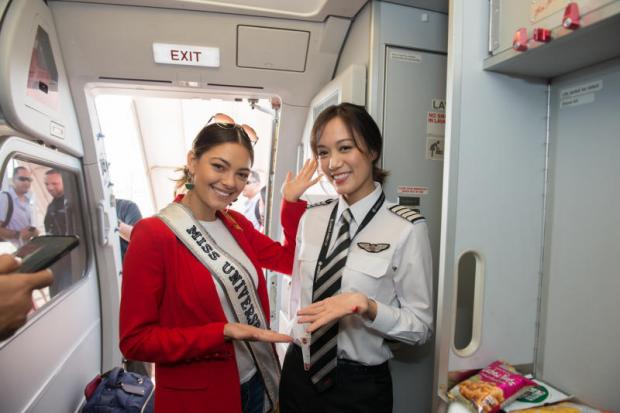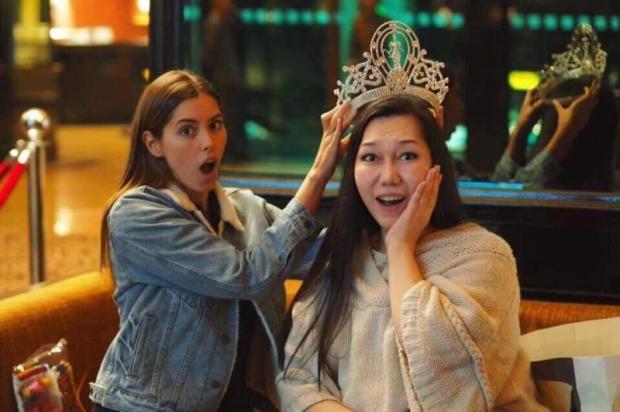Bringing a close to this year's beauty pageant season, Catriona Gray from the Philippines was yesterday crowned the 67th winner of Miss Universe, one of the biggest international pageants. The event was broadcast to millions worldwide who tuned in to cheer for their country's representatives and their favourite beauty queens.
As a form of entertainment, beauty pageants have endured for decades. As their name suggests, they value one thing above all: beauty. At least, that was what they originally set out to do: look for the girl on stage with the best face, body, posture and manner, judged as they parade around in skimpy swimsuits and gorgeous gowns.
But is that still all there is to beauty pageants and their queens? In this fast-changing world, are beauty pageants still relevant or appropriate? Can they serve as a form of empowerment to women?

Chananporn Rosjan, right, and Miss Universe 2017 Demi-Leigh Nel-Peters.
"It's entertainment, first of all. The world can be a stressful place and beauty pageants are one outlet that people can enjoy," said Chananporn Rosjan, a former beauty queen who represented Thailand at Miss Universe 2005. "At the same time, it's a platform for women to do something with their lives. For a woman to make a difference or speak out in this male-dominated society, sometimes that's not something they can just do outright. Beauty pageants are places where they can do that."
Chananporn's life and career came full circle this month when, as a pilot at AirAsia, she flew this year's Miss Universe contestants and 2017 winner Demi-Leigh Nel-Peters to Krabi for their excursion. It made her nostalgic to see the new generation of girls alongside the staff who have been working on the pageant since she was a contestant herself.
Chananporn recalled that her time in the pageant felt like a summer camp that passed by in a blur. Afterwards, she returned to her normal life and job, but newly equipped with the skills and experiences she acquired as a beauty queen.
"One of the reasons why I entered the pageant was because I can be quite an introvert. I was quiet. I had no social skills. In a way, it was like I was forcing myself to speak more and interact with people better, to develop skills I was lacking.
"To this day, I still use what I've learned from the pageant," she continued. "Being a pilot involves teamwork. Every day, the crew changes and I have to develop new relationships. I'm a captain, so I have a huge responsibility. It's crucial to create a good and safe working atmosphere for everyone."

Chananporn Rosjan.
Over the years, beauty pageants have been criticised for prizing women's looks while disregarding their other attributes. Chananporn shrugged off this idea.
"Honestly, doesn't everyone in the world judge others based on appearances and first impressions? With people who have good looks, manners, bodies, styles and profiles, others generally perceive them positively before they get to know them," she said. She believes that beauty pageants can indeed be empowering to women. This is certainly the direction some beauty pageants have been shifting towards in recent years.
"Empowerment goes beyond just the outer shell. It looks further, into how a woman can be beneficial to society and the world. This is why the context of beauty pageants have slowly changed. Miss Universe, for example, has changed from someone with a flawless face and body to someone with life experiences they can share, someone who initiates and continues social work. A role model."
Observing these changes for the last three decades or so has been Aishwarda Sirilaksana, a Miss Universe "super fan", who was a winning contestant on the Fan Pan Tae game show for her extensive knowledge of the pageant. She echoed Chananporn's opinion, saying that Miss Universe back in the 1960s and 1970s used to be someone who was exceptionally pretty but spoke little. But nowadays, contestants face interviews and tough questions on topics ranging from politics to social movements -- questions that could have been designed for politicians, she said.

Aishwarda Sirilaksana, right, with Miss Universe 2014 Paulina Vega Dieppa, in Thailand.
"Before, we'd always hear people say that beauty queens have no brains, that all they do is prance around all day. Perhaps now the pageants want people to take them more seriously, so they give them tricky subjects to talk about. In a way, it lifts the standards of beauty pageants. It shows that being pretty is not everything. You have to have a good mind too," said Aishwarda.
Doctors, lawyers, bank managers, soldiers, pilots and women from all kinds of backgrounds have been among the contestants at the pageant. It reflects the diversity of women and serves as a reflection of society's changing mindset and growing equality.
This year in particular marked quite a milestone for Miss Universe, as it welcomed the first transgender representative at the competition.
"Some people have said they are afraid Miss Universe will turn into a stage for transgender women," commented Aishwarda. "But not just any trans can put on the sash. They have to have what it takes.
"Women all possess beauty within them. If they have what it takes, anyone can be Miss Universe regardless of country, race or anything."
Beauty is in the eye of the beholder. So are the benefits of beauty pageants. As someone who started watching Miss Universe when she was young, Aishwarda said she learned a lot of things other children her age didn't from the "Olympics of beauty". International languages, tourism, culture and even how a woman should carry herself are just some of the things one can learn from watching beauty pageants.
Aishwarda also added that beauty pageants can be used as a means of forging international friendships and a form of soft diplomacy. Such is the potential role and relevance of beauty pageants in today's society, she said, for both women and general audiences. In this diverse and ever-changing world, it is simply another arena of life.

